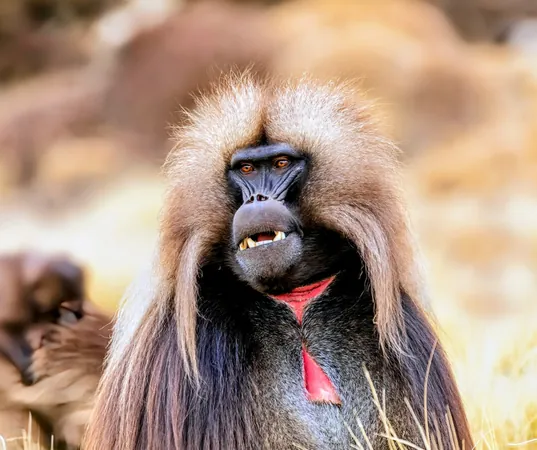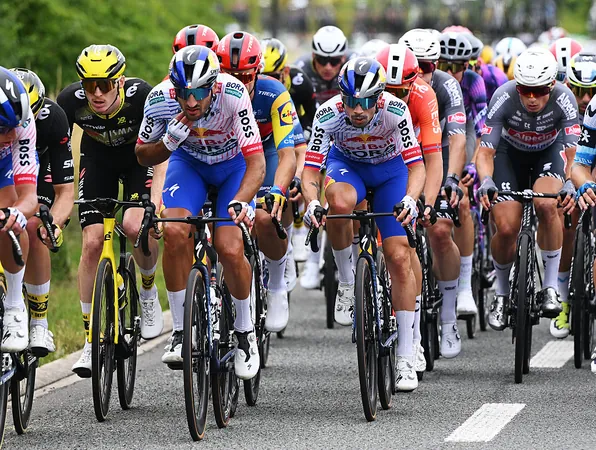
The Hidden Price of Power: What Alpha Male Primates Sacrifice for Dominance
2025-01-26
Author: Ying
The Price of Leadership
A recent study reveals that alpha baboons face considerable stress—not from rivals, as one might assume, but from the intense responsibility of guarding their mates. This constant vigilance leads to a toll on their physical and mental health, raising questions about the real benefits of alpha dominance.
To be an alpha baboon isn't just about achieving power; it involves enduring extreme pressure to maintain it. The research conducted by the Duke University team highlights that these dominant males must engage in relentless monitoring of their female counterparts, often foregoing opportunities to relax, eat, or socialize with others.
According to Professor Susan Alberts, "They’re essentially staking a claim; preventing other males from gaining access." This persistent need to guard against rivals can evolve into significant stress, affecting every aspect of an alpha male’s life.
The Stress Factor
The long-term field studies conducted in Kenya's Amboseli National Park have provided valuable insights over decades. Researchers studied the social behaviors of baboons, revealing that alpha males display significantly elevated levels of glucocorticoids, hormones linked to stress. Interestingly, the study outlined that traditional aggressive behaviors, such as fighting other males, did not contribute notably to their stress levels.
What they found was surprising: increased stress hormones correlated more closely with the time spent guarding fertile females than with conflicts among males. The data spanning 14 years showed that alpha males experienced 6% higher glucocorticoid levels compared to their lower-ranking peers.
Moreover, a related observation was noted: the energy expenditure of alpha males exceeded their intake. The constant distractions while trying to eat led to draining their energy reserves, resulting in lower thyroid hormone levels—a biological signal that they are grinding away at their physical well-being.
A High Cost for a Fleeting Status
The findings from Amboseli suggest a sobering truth—higher rank often correlates with shorter lifespans and accelerated aging among alpha males. Past studies indicate that the stress they endure has larger implications that go beyond immediate discomfort; it alters their health, hastening the aging process.
After losing their alpha status, these males face a challenging recovery, as years of stress leave a permanent mark on their bodies. The research emphasizes that while being an alpha male may offer short-term rewards—like mating opportunities and exclusive resource access—the long-term consequences can be detrimental, undermining overall health and longevity.
Lessons for Human Society
Despite the obvious differences between baboon and human societies, there are noteworthy parallels in the dynamics of leadership. The importance of emotional resilience and stress management is crucial for anyone aspiring to be at the top, whether in a corporate office or a community group. Being an effective leader not only demands initiative and assertiveness but requires strategies to cope with high-pressure situations—an important takeaway for anyone navigating their own leadership journey.
As the study elaborates, the sacrifices made for status and power are profound, underscoring the notion that all leadership comes with challenges, demanding a balance between ambition and well-being. The legacy of stress borne by alpha baboons serves as a powerful reminder that the pursuit of power can often lead to unforeseen consequences.
This fascinating study is published in the journal Proceedings of the Royal Society B, adding critical knowledge to the ongoing conversation about the intricacies of social structures and individual health in both animal and human behavior.



 Brasil (PT)
Brasil (PT)
 Canada (EN)
Canada (EN)
 Chile (ES)
Chile (ES)
 Česko (CS)
Česko (CS)
 대한민국 (KO)
대한민국 (KO)
 España (ES)
España (ES)
 France (FR)
France (FR)
 Hong Kong (EN)
Hong Kong (EN)
 Italia (IT)
Italia (IT)
 日本 (JA)
日本 (JA)
 Magyarország (HU)
Magyarország (HU)
 Norge (NO)
Norge (NO)
 Polska (PL)
Polska (PL)
 Schweiz (DE)
Schweiz (DE)
 Singapore (EN)
Singapore (EN)
 Sverige (SV)
Sverige (SV)
 Suomi (FI)
Suomi (FI)
 Türkiye (TR)
Türkiye (TR)
 الإمارات العربية المتحدة (AR)
الإمارات العربية المتحدة (AR)